I have an object T. I need to send the file representation of it into a web service. Without saving the file to a temp file.
WebService method:
myClient.SendFile(
new SendFileData{
id = "1",
fileName = "Foo",
fileType = "json",
fileContent = base64, // string Base64 variable here
}
To get the Base64 of a file I use :
public static string FileToBase64(string path) => FileToBase64(File.ReadAllBytes(path));
public static string FileToBase64(Byte[] bytes) => Convert.ToBase64String(bytes);
I have made those method to work on a temp file stored in a directory. saving the Json to file using :
using (StreamWriter file = File.CreateText(tempPath))
{
JsonSerializer serializer = new JsonSerializer();
serializer.Serialize(file, _data);
}
And reading it like:
Directory.GetFiles(directory).Where().Select(x=> new {
fi = new FileInfo(f),
name = Path.GetFileNameWithoutExtension(f),
ext = Path.GetExtension(f).Trim('.'),
content = FileBase64Helper.FileToBase64(f)
})
I try to make a in memory file and convert it to b64 like:
public void Demo()
{
var myObject = new CustomType { Id = 1, Label = "Initialisation of a custom object" };
var stringRepresentation =
JsonConvert.SerializeObject(myObject, Formatting.Indented, new JsonSerializerSettings { });
SendFileData dataProjection = new SendFileData { };
var result = FakeClient.SendFile(dataProjection);
}
public class CustomType
{
public string Label { get; set; }
public int Id { get; set; }
}
public static class FakeClient
{
public static bool SendFile(SendFileData data) => true;
}
public class SendFileData
{
public string id { get; set; }
public string fileName { get; set; }
public string fileType { get; set; }
public string fileContent { get; set; }
}
Comparaison between direct convertion and FileReadByte:
var myObject = new CustomType { Id = 1, Label = "Initialisation of a custom object" };
var stringRepresentation = JsonConvert.SerializeObject(myObject, Formatting.Indented, new JsonSerializerSettings { });
var directSerialization = Convert.ToBase64String(Encoding.UTF8.GetBytes(stringRepresentation));
var tempPath = @"test.json";
using (StreamWriter file = File.CreateText(tempPath))
{
JsonSerializer serializer = new JsonSerializer();
serializer.Serialize(file, myObject);
}
var fromFile = FileBase64Helper.FileToBase64(tempPath);
SendFileData dataProjection = new SendFileData { };
var result = FakeClient.SendFile(dataProjection);
Direct serialization:
ew0KICAiTGFiZWwiOiAiSW5pdGlhbGlzYXRpb24gb2YgYSBjdXN0b20gb2JqZWN0IiwNCiAgIklkIjogMQ0KfQ==
From file
eyJMYWJlbCI6IkluaXRpYWxpc2F0aW9uIG9mIGEgY3VzdG9tIG9iamVjdCIsIklkIjoxfQ==


